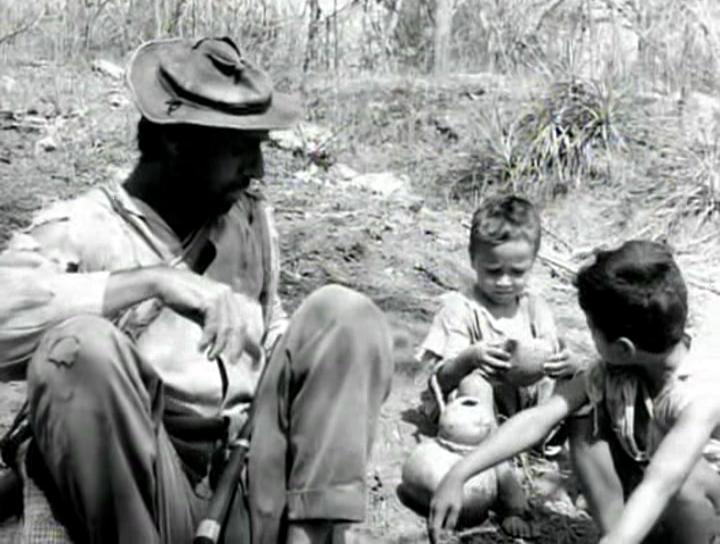Now, I cannot for a second claim that my viewing of all of Brazil’s significant films in the history of the nation’s cinema is complete. However, making a watch list for myself is just one motivation for writing this piece. The others are: one, there are likely many coming across this piece who couldn’t name a handful of Brazilian films. Second, it’s really about thinking of films and culture in a different way. This really isn’t about naming what is the greatest Brazilian film of all-time, or any other nation that this series might focus on, but rather to open the discussion on a nation-by-nation basis about indigenous cinemas and cultural portraiture. If I had one film, and one film only, to show someone to say “This is Brazil and what you need to understand about it” what film would open that dialogue best, if not address all those points?
This idea came to me after a recent viewing of Vidas Secas (Barren Lives). I’m not sure that film is the representative choice but it gave me the idea, and made me think “At least I’ve seen this film now and my citizenship won’t be revoked.” What struck me as particularly Brazilian in the film was not only its locale (Brazil, like all large nations, can be quite regional but there’s seemingly something universally Brazilian about the northeast) but also the theme of persevering through hardships in that film.
Universal themes such as the ones mentioned above are just one of the watermarks of these films that can be discussed, aside from more specific traits like the migrant population and the era in the nation’s history. While the themes touched upon in the film are very Brazilian, it is a tale of being humbled, a thoughtful drama, which doesn’t have the joie de vivre that is so common in Brazil, and many other Latin nations, in spite of circumstances. Does that mean Vidas Secas can’t be the emblematic film? No, but others are worth considering, this one is still alive.
Films like Kiss of the Spider Woman, or any other foreign production, are not in the running. That specific example was clearly shot in Brazil by a naturalized Brazilian director but the way the script was written it could’ve been any authoritarian Latin American state in the 1980s, locality wasn’t the point of the film.
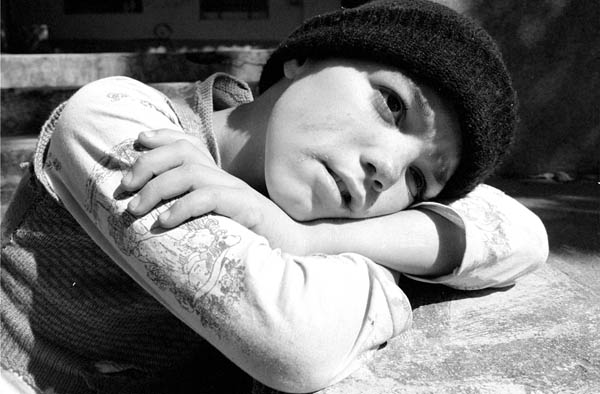
Fernando Ramos da Silva in Pixote, A Lei dos Mais Fraco (HB Filmes)
Another Babenco film Pixote is a better example thematically. However, once you factor in the unfortunate history the film has (A child of the favelas, Fernando Ramos da Silva [pictured above] was cast for authenticity, but was murdered at the age of 18, as he went back to live where he always had) makes choosing this film a bit sensationalistic and tabloid, not that I’m looking to have my selection propagandize, but the film and the aftermath are inextricable to me. Such that any symbolic honor not based solely on cinematic merit is difficult to bestow upon it. I could, and still may, write a whole other piece about the ethics of hiring impoverished amateur children as actors. This case, and that of Slumdog Millionaire, illustrate a cruel injustice in my mind: the bottom line is there are professional actors of all ages everywhere, if you do not want to be beholden to that child after the film, as you should be, hire one of them. If you hire an amateur child from substandard living conditions you should, as Walter Salles did for Vinícius de Oliveira in Central Station, help improve their station in life. At that point you truly are picking a lottery winner rather than just casting a role.
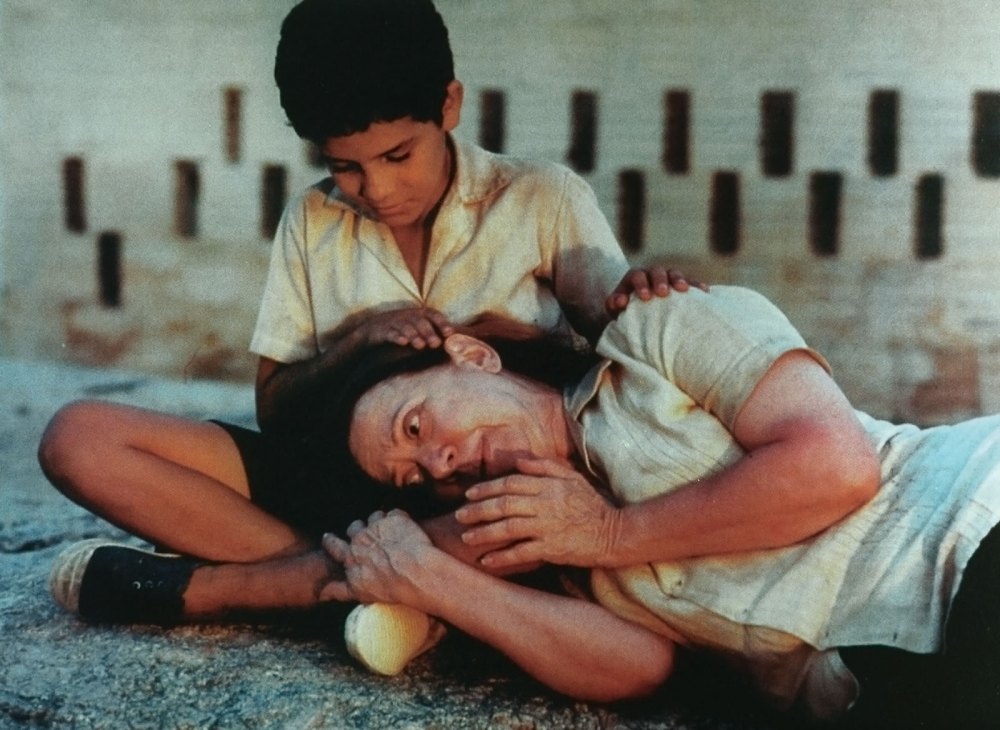
Vinícius de Oliveira and Fernanda Montenegro in Central Station (Sony Pictures Classics)
What of Central Station then? Central Station made quite a bit of money in the US. It was nominated for an Oscar for Best Foreign Language Film and Best Actress. Brazil has more a pedigree on the high-end of world cinema than most would expect. What separates Brazil from most is the consistency of product and, of course, due to the dictatorship there was censorship and artists had to fend for themselves. Now, the government is more active in promoting the arts, the major studios have a presence in the country and so forth. Yet, the fact that Brazil has been up for the Oscar, is the only Latin American nation to win the Palme d’Or (O Pagador de Promessas) and has also scored at Berlin (Elite Squad) is not what is going to dictate the most Brazilian film. Those are just indicators of quality.
Therefore, what’s the quality of Central Station? It has memorable source music, it’s a heart-wrenching drama, it tells a tale of a letter-writer and poor illiterate boy. It crosses that divide and it check off a lot of the qualities I’m looking for in a film representative of Brazil. Not to mention that it’s named after the largest train station in the country, therefore it’s a metaphor for the country and the letter-writer hears many stories from people of all walks of life that are indicative of the country and its people. The blend that exists.
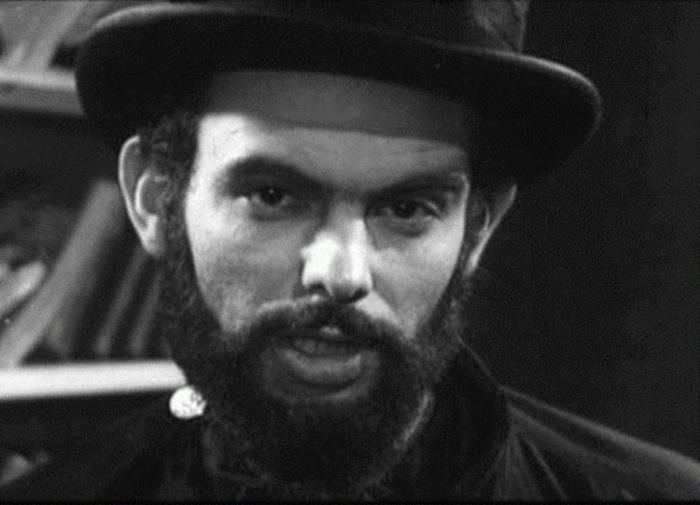
José Mojica Marin in À Meia-Noite Levarei a Sua Alma (Anchor Bay)
I think perhaps what is most important about addressing this question is deciding why certain films, or series of films, are being selected. It truly becomes a bit existential for me (and a tad corny) because the search is where the value is. Take for example the Coffin Joe films, after having seen a box set of his works I watched the documentary about him. In that film his frequent screenwriter made a very astute observation, which is that José Mojica Marins did something he thought was impossible: he created a Brazilian horror personage. All the other archetypes are decidedly American or European but this blend of religion, existentialism, patriarchy, propagation and misogyny is the perfect Brazilian horror type. In one singular, virtually indestructible entity Marins encapsulates and exaggerates virtually every possible aspect of the male psyche in Brazil and twists it to horrific effect. Does this make his films the most Brazilian? It’s not entirely out of the question. It certainly makes his films worth mentioning here, but hearkening back to how I introduced this question; no, I wouldn’t show someone Coffin Joe and say “This is Brazil.” I would show them Coffin Joe and say “This is horror” though.
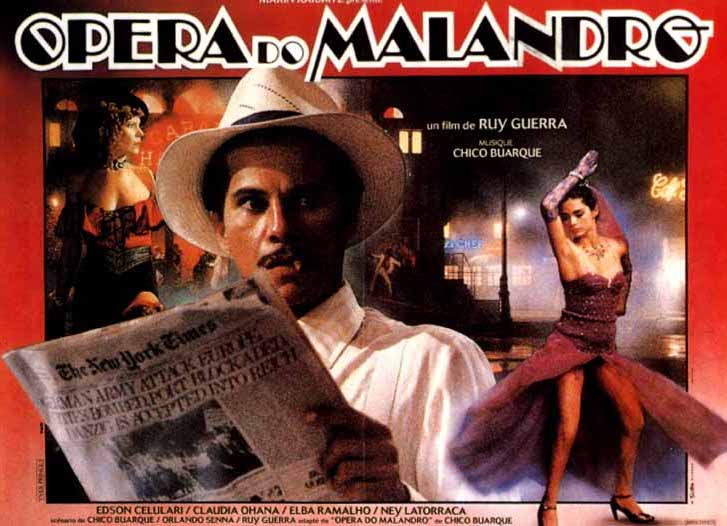
A Opera do Malandro (The Samuel Goldwyn Company)
Now, with regards to the aforementioned regional aspect to the country, I and most my family have our roots set in Rio de Janeiro, though we’ve since scattered quite a bit. With that in mind, most of us recognize and appreciate the musical diversity of the country, but our affections are usually for Samba and MPB (Música Popular Brasileiro) above all else. Few artists represent these genres and Brazil as well as Chico Buarque. That brings me to A Opera do Malandro, which is a musical based on an album he wrote. It wasn’t Buarque’s only foray into musical entertainment, he and many stars wrote a version of the Town Musicians of Bremen (‘Os Saltimbancos’) that is a standard. Yet, here his tale is a cinematic adaptation, period piece, a sort of Brazilian noir, which represents a kind of Brazilian, (the Malandro), akin to but nor quite a wise guy back in a similar era here. So it doesn’t quite pass the universality test.
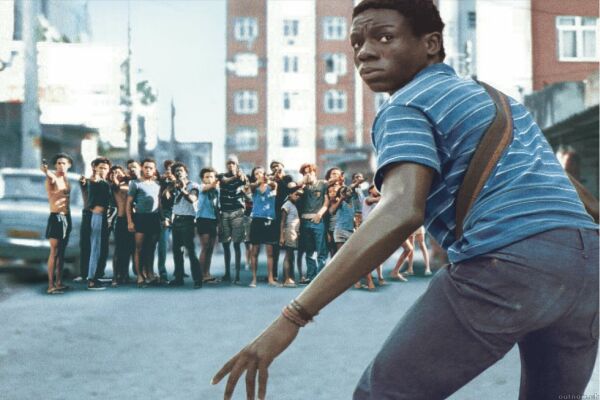
Alexandre Rodrigues in Cidade de Deus (Miramax)
Perhaps, the most accomplished work in the history of Brazilian cinema is City of God. This is a film that was a hit domestically as well as internationally, it earned box office success and critical acclaim. When writing about it I have likened it to the great films in history. Again this selection isn’t about greatness but representativeness. So while this film and the Tropa de Elite (Elite Squad) movies are great dramatizations of societal problems and brilliantly map out “How’d things get this way?” they don’t paint a portrait of all of Brazil, which I’ll admit is hard to do, but as endemic as corruption in police and politics is, and as large as trafficking and crime syndicates in favelas have been, they are localized stories cinematically. So we move on to other choices.
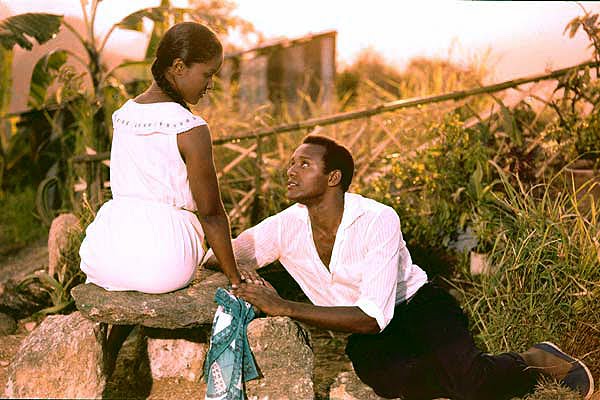
Marepessa Dawn and Breno Mello in Orfeu Negro (Janus Films)
Perhaps, some symbolic stories are the last two that need to be discussed: Orfeu Negro (Black Orpheus) and Dona Flor e Seus Dois Maridos (Dona Flor and Her Two Husbands). Now, the former has had international success. However, it is a co-production with France, which I could even let slide but the fact of the matter is its the transposition of a Greek myth to (at the time) modern day Rio. Therefore, as Brazilian as it is with Carnaval and Samba Schools, it’s still rather European too. As for Dona Flor, its incorporation of Magical Realism and its colonial/post-colonial commentary made indirectly through her husbands and the fact that it’s based on a novel by one of Brazil’s greatest authors (Jorge Amado) make it a great candidate. However, Amado is Amado. As much of the director’s voice as can be added is but if you know anything about his work any of them bear his mark a bit too much to be truly emblematic of a nation in the encompassing sense I’m trying to choose said film within, which rules out any films based on Nelson Rodrigues‘ plays.
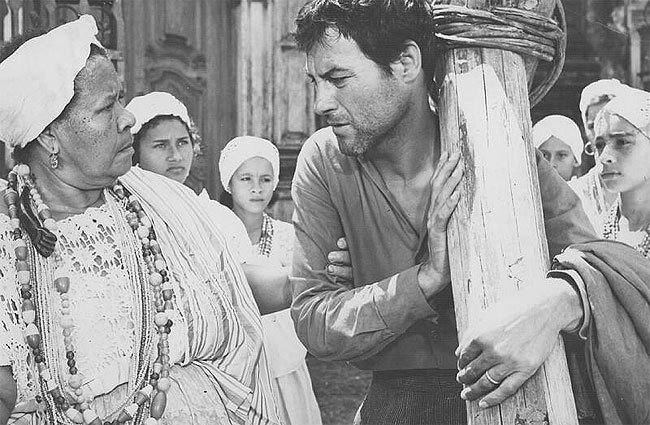
Leonardo Villar in O Pagador de Promessas (Lionex Films Inc)
So even as I began to outline and write this piece I realized there are big films from Brazil that I have not seen. At least two would be candidates for this honor The Given Word (The Given Word) and Menino de Engenho (Plantation Boy). There are likely others as well but those two are likely the ones with a universal quality combined with indigenous uniqueness that would qualify it here. For now, based on what I’ve see it’s Central Station, but I’m quite eager to continue searching and if you have any suggestions yourself please feel free to comment below!








